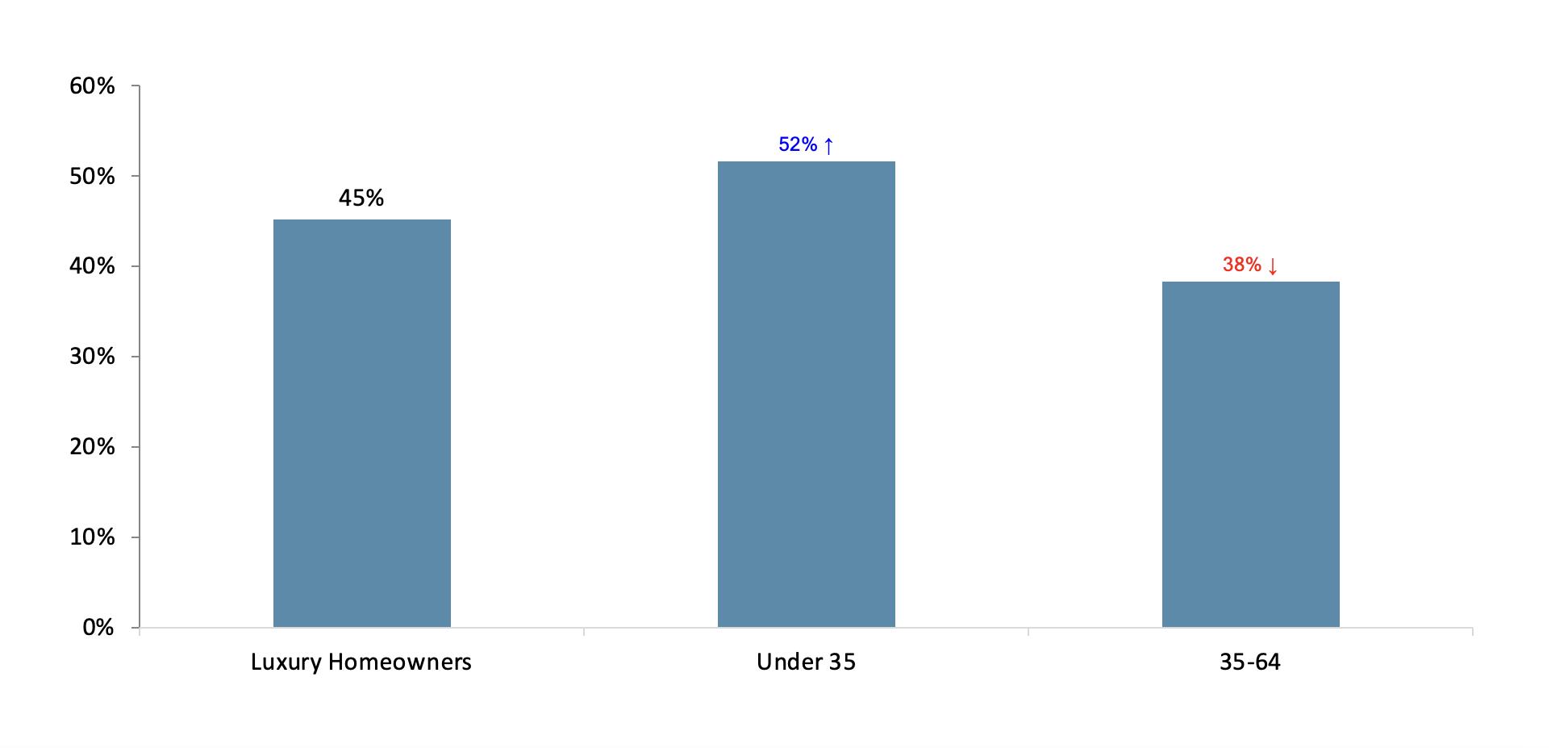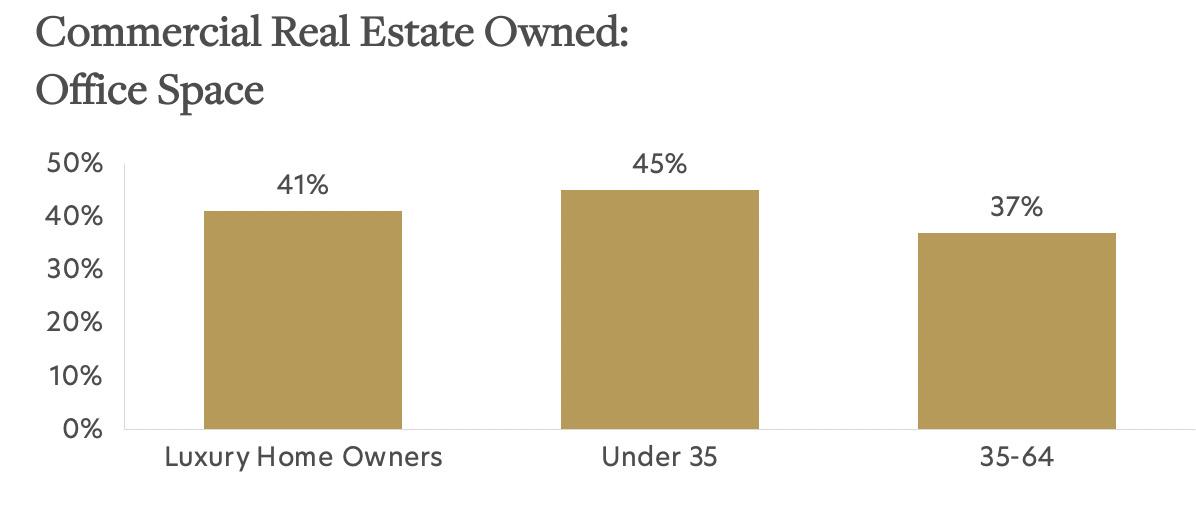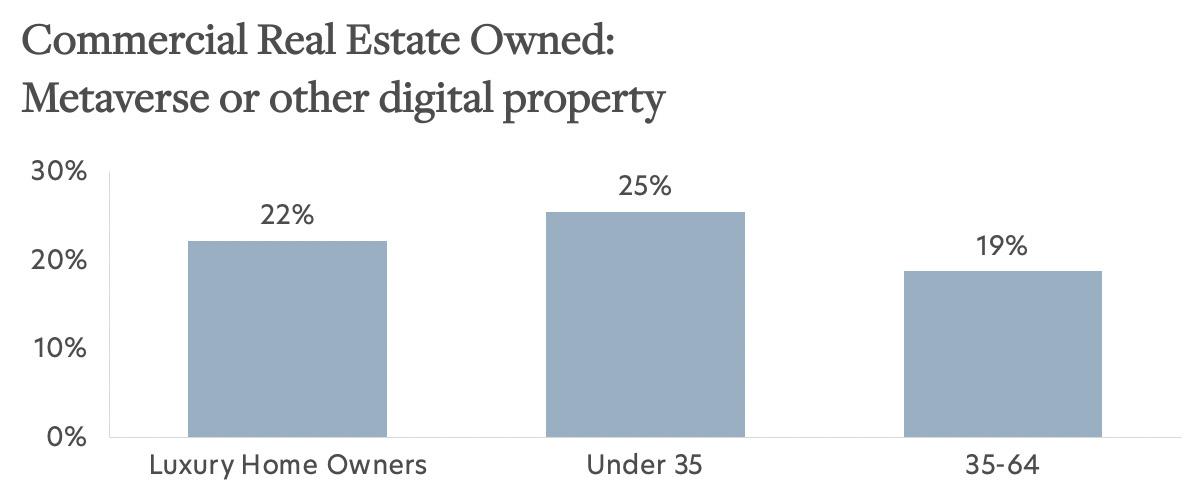
2 minute read
RESIDENTIAL REAL ESTATE PORTFOLIO
The world of luxury real estate is vast and dynamic, with preferences and ownership trends varying across age groups.
Here, we look at the fascinating differences between luxury homeowners under 35 and those aged 35-64, highlighting their unique perspectives on property ownership and revealing insights that could potentially reshape the luxury property market.
Extended-family Properties: The New Frontier for Young Luxury Homeowners
In a surprising twist, data shows that 52% of luxury homeowners under 35 own extended-family properties, compared to 38% of those aged 35-64 – a notable difference of 13 percentage points.
Younger generations place a higher value on family and communal living, which has translated into a growing preference for extended-family properties
Residential Real Estate Owned: Extended-family Property
College/University Property Investments: The Future of Luxury Real Estate?
Another intriguing finding is the significant difference in the ownership of college/university properties between the two age groups.

While only 9% of luxury homeowners aged 35-64 own such properties, a staggering 22% of those under 35 have ventured into this market – a difference of 13 percentage points.
This trend might be driven by younger generations’ focus on education and investment in their children’s future.
By owning college/university properties, these young luxury homeowners are not only securing prime real estate but also investing in the future success of the next generation.
Weekend/Retreat Properties: The New Status Symbol?
While vacation properties remain popular among both age groups, weekend/retreat properties have emerged as a new status symbol for luxury homeowners under 35. The data highlights a 10-percentage point difference, with 33% of younger homeowners owning weekend/retreat properties compared to just 23% of their middle-aged counterparts.

These younger buyers are looking for more than just a place to escape their busy lives. They are seeking exclusive experiences and one-of-a-kind retreats that allow them to unwind while enjoying luxurious amenities and stunning locations.
Residential Real Estate Owned: Weekend/Retreat Property

Commercial Real Estate Portfolio
Office Space: A Tale of Two Cities
Office space remains a popular choice for luxury homeowners, with 41% of them holding investments in this area.
However, when parsed by age group, there is a noteworthy difference between those under 35 (45%) and those aged 35-64 (37%).
Such disparity may be attributed to young entrepreneurs who are drawn to tech startups and coworking spaces, while their middle-aged counterparts tend to favor more traditional settings.
Multi-Family Dwellings: The Modern Urban Jungle
The allure of multi-family dwellings as an investment keeps growing among luxury homeowners regardless of their age.
With 40% of investors under 35 and 37% of those between 35-64 years old investing in multi-family properties, it is clear that these assets remain an attractive option for both generations. This could be linked to the increasing demand for urban living, as more consumers seek to reside close to their work, leisure and socializing spots.
Virtual Ventures: Metaverse Real Estate Takes Center Stage
One of the most striking differences observed lies within the realm of digital property.
Metaverse or digital real estate investments show a fascinating divergence, with 25% of investors under 35 and only 19% of those aged 35-64 putting their money into this new frontier. This reflects the growing interest in virtual reality and online spaces, such as Decentraland, where digital real estate is bought, sold and developed.


Digital luxury brands such as Gucci have already ventured into the metaverse, creating unique experiences for their customers. As more luxury brands adapt to this virtual revolution, it is likely that the gap between younger and middle-aged investors in digital real estate will continue to widen.
As the world embraces new forms of luxury, so do the investment preferences of luxury homeowners.
The rise of metaverse real estate and the continued popularity of office space and multi-family dwellings showcase the diversity and adaptability of luxury homeowners when it comes to commercial property investments.
Key Takeaways
Luxury homes are popular among both younger and middle-aged affluent buyers.
Younger buyers prefer large family homes, college properties and weekend retreats.
Wealthy people of all ages invest in office spaces and upscale apartment buildings.

Virtual land investments attract more young affluent consumers compared to older ones.
Different age groups have unique preferences, shaping the future of luxury real estate.










